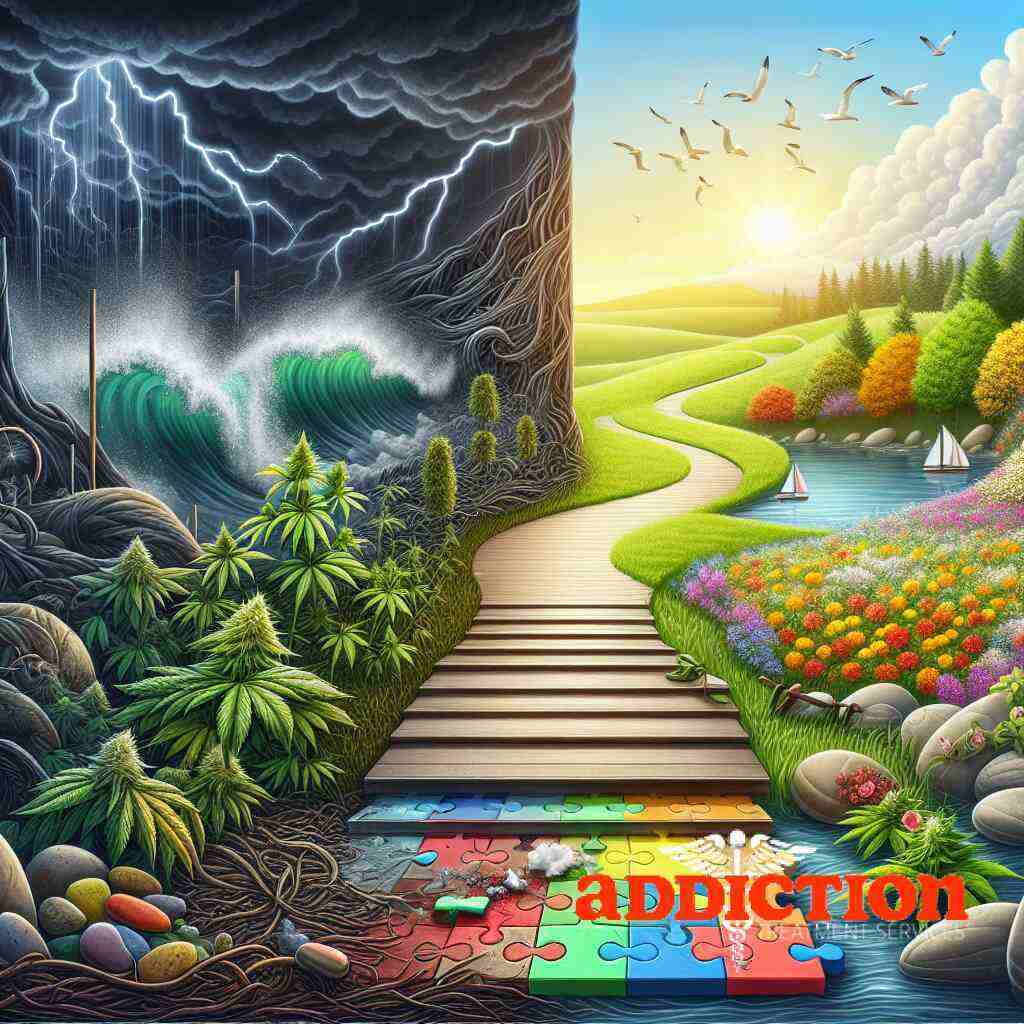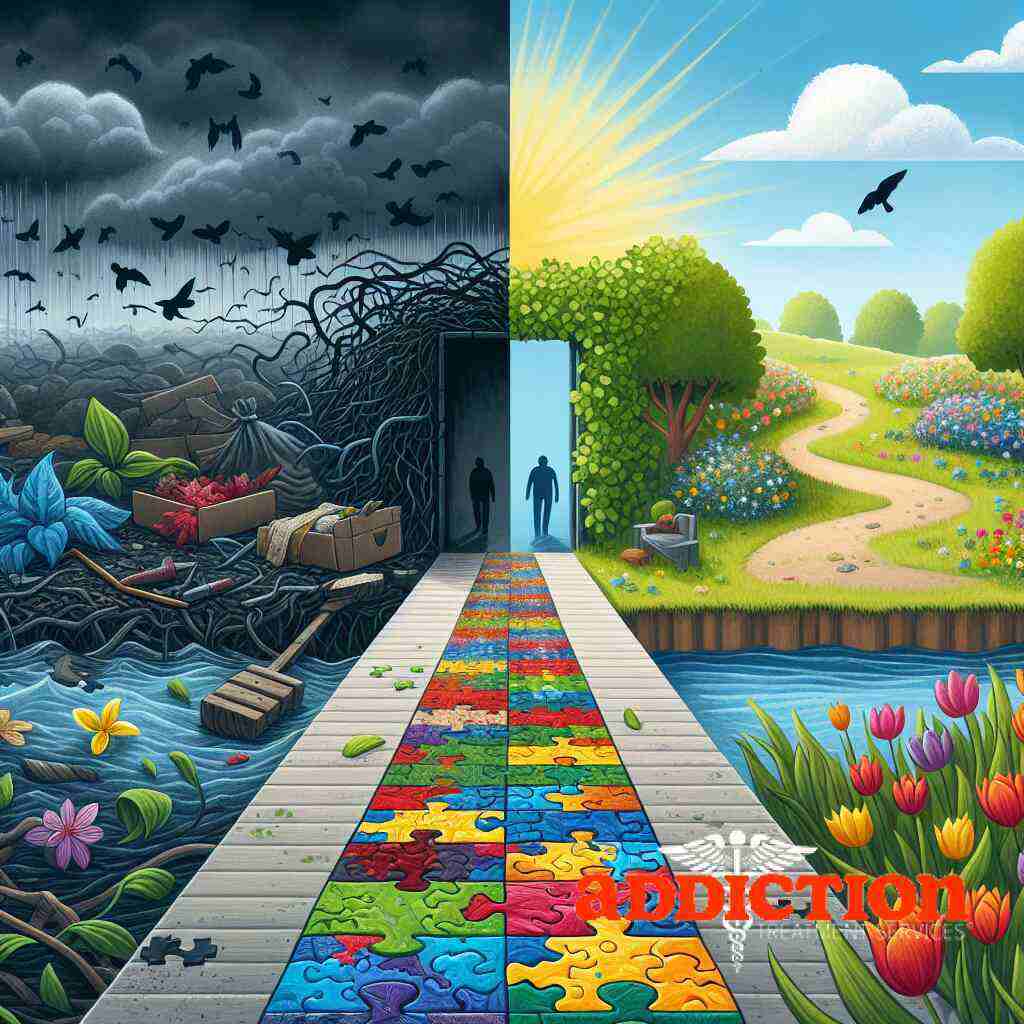 Posted On: 06/06/2024
Posted On: 06/06/2024Introduction to Marijuana and Its Addictive Potential
Understanding Cannabis Use Disorder
Cannabis Use Disorder (CUD) is a condition characterized by an individual’s inability to regulate their marijuana use despite facing social, occupational, or health-related consequences. The notion of marijuana addiction has historically been contentious,however, scientific studies and clinical evidence suggest that long-term, heavy use of cannabis can lead to addiction. The American Psychiatric Association recognizes CUD as a diagnosable condition, highlighting the potential for dependency on this widely used substance. This disorder manifests through a variety of symptoms, including cravings, tolerance development, withdrawal symptoms upon cessation, and continued use despite recognizing the harmful consequences.
The Debate on Marijuana Dependency
The discourse around marijuana dependency is polarized, with opinions varying drastically from one individual to another. Debates often revolve around cannabis’s addictive properties compared to other substances, such as alcohol or tobacco. Proponents argue that marijuana possesses lower risk factors for dependence than these substances, while opponents point to increasing evidence of cannabis’s potential for abuse, particularly among adolescents and young adults. This complexity is furthered by the variable THC concentrations found in different cannabis products, which can significantly influence the risk of developing dependency.
Misconceptions about Weed
Misconceptions about weed are abundant and contribute significantly to the debate on its addictive potential. A common myth is that marijuana is a “harmless” drug without serious implications for addiction or abuse. This misconception overlooks the veritable experiences of individuals dealing with CUD, underestimating the challenges associated with its withdrawal and recovery processes. Recognizing and dispelling these myths is crucial for a balanced understanding of marijuana use, its risks, and the support available for those seeking to overcome its hold, such as through addiction therapy services. Awareness and education are key to changing the narrative around cannabis use and its potential for addiction, aiming for a more informed and empathetic approach to addressing and treating CUD effectively.
Identifying Signs of Weed Addiction
Behavioral Changes and Dependence
The journey to recognizing a dependency on marijuana often begins with observing significant behavioral changes. These can manifest as prioritizing cannabis use over hobbies, responsibilities, or relationships that were once important. A hallmark sign of addiction is when an individual continues to use marijuana despite facing negative consequences in their personal or professional life. This could range from deteriorating personal relationships to absenteeism at work or school. Additionally, an increased tolerance to weed, leading to the consumption of larger amounts to achieve the same high, signals a growing dependence. These behavioral shifts are critical indicators that it might be time to search for addiction therapy services nearby that can provide support and guidance.
Physical and Psychological Withdrawal Symptoms
Withdrawal symptoms from cannabis are often both physical and psychological, manifesting when an individual reduces or discontinues use after a period of heavy and prolonged consumption. Physical symptoms can include headaches, nausea, insomnia, and a decrease in appetite, while psychological symptoms might encompass irritability, anxiety, mood swings, and depression. These symptoms can significantly impact daily functioning and are a clear sign of the body’s dependence on THC, the psychoactive compound in cannabis. Addressing these symptoms early, through avenues such as an outpatient program for cannabis dependence, can be a crucial step in the recovery process.
Impact on Daily Functioning
Marijuana addiction’s impact on daily life can be profound and multifaceted. Individuals may find it increasingly challenging to fulfill daily responsibilities, such as work, school, or family obligations, due to the effects of chronic cannabis use. Cognitive impairments, including difficulties with attention, memory, and learning, can hinder academic and professional performance. Moreover, the financial strain of maintaining a regular marijuana habit can lead to significant stress and anxiety, exacerbating the cycle of addiction. Recognizing these effects is crucial for understanding the need for treatment and support, including engaging in behavioral health services for addiction, to mitigate the profound impact on an individual’s quality of life and well-being.
Marijuana Addiction Treatment Services
Addiction Treatment Services Directory
Addiction Treatment Services provides a comprehensive directory catering to those seeking assistance for marijuana addiction. This directory is a vital resource for individuals and family members looking for addiction treatment centers focused on cannabis use disorder. Our extensive network spans across all 50 states, offering information on rehabs focusing on substance misuse, including specific programs tailored to marijuana dependency. Whether you’re exploring outpatient care, residential treatment, or specialized services such as medication-assisted treatment, our directory positions you to find the best support available. By leveraging our addiction treatment services directory, you can easily navigate the myriad of treatment facilities, ensuring access to quality care tailored to your needs or those of a loved one.
Outpatient Treatment for Marijuana Addiction
Outpatient treatment for marijuana addiction offers flexibility and support for individuals who wish to maintain their daily responsibilities while receiving treatment. Addiction Treatment Services connects you with top-tier outpatient care facilities, where you can engage in comprehensive programs designed to address the unique challenges of substance misuse. These programs often include individual counseling, group therapy, behavioral therapy, and support for managing withdrawal symptoms, all critical components for a successful recovery. For those seeking focused support without the need for residential care, engaging intensive outpatient programs for addiction can be a pivotal step towards recovery, providing structured yet flexible schedules to accommodate work or school commitments.
Residential and Detoxification Services for THC
For individuals with a severe dependency on marijuana, residential treatment provides an immersive environment dedicated to recovery. Addiction Treatment Services lists top-rated residential and detoxification services for THC, where individuals can receive round-the-clock care in a supportive and therapeutic setting. Detoxification is often the first step to cleanse the body from the effects of long-term cannabis use, with techniques for detoxification from drugs that safely manage the withdrawal process under medical supervision. Following detox, residential programs offer intensive therapy and holistic treatments to address the root causes of addiction, support mental health, and build relapse prevention strategies. These facilities emphasize a holistic approach, integrating physical, psychological, and emotional support to foster long-term recovery.
Holistic and Behavioral Health Services
Integrating Mental Health Services for Drug Addiction
Integrating mental health services into the framework of addiction treatment addresses the complex interplay between substance abuse and psychological well-being. Recognizing that substance use disorders, including those related to marijuana, often coexist with conditions like depression, anxiety, and PTSD, is crucial. This comprehensive approach entails assessing the individual’s mental health status and tailoring interventions that concurrently target both the addiction and any underlying psychological conditions. For instance, cognitive-behavioral therapy (CBT) can be highly effective in treating both mental health issues and substance abuse by teaching individuals coping strategies to manage stress and triggers that may lead to marijuana use. Dual diagnosis programs, a component of some marijuana addiction treatment in California, exemplify this integrated treatment model by offering a coordinated approach that addresses both areas simultaneously. By fostering resilience and equipping individuals with tools to tackle both their mental health challenges and addiction, holistic treatment services pave the way for a more sustainable recovery.
Behavioral Health Services for Addiction
Behavioral health services for addiction focus on changing behaviors through interventions like therapy and lifestyle modification, which are vital in treating marijuana addiction. These services utilize evidence-based practices to help individuals understand the root causes of their addiction, develop healthier coping mechanisms, and rebuild their lives. Treatment might involve individual counseling, group therapy sessions, and family therapy, aiming to improve communication, resolve conflicts, and enhance overall family dynamics affected by substance abuse. Techniques such as motivational interviewing and contingency management can be particularly effective, encouraging positive behavior change and adherence to treatment. Integrating behavioral health services in addiction treatment plans ensures a comprehensive approach that addresses the multifaceted nature of substance abuse, facilitating not just temporary abstinence but long-term recovery and well-being.
The Role of Intensive Outpatient Program
Intensive Outpatient Programs (IOPs) play a pivotal role in the continuum of care for individuals struggling with marijuana addiction. These programs offer a structured therapy environment that allows participants to maintain their regular commitments to work or school while receiving treatment. Flexibility, combined with intensive care, makes IOP an attractive option for many. Participants engage in several hours of therapy per week, including group sessions where they can learn from others’ experiences and individual counseling for personalized attention. The intensive nature of these programs helps to build a strong foundation for recovery by focusing on relapse prevention skills, coping strategies, and fostering a support network among peers. IOPs often include education on substance abuse and mental health, equipping individuals with the knowledge to understand their addiction and manage their recovery proactively. For those in the early stages of their recovery journey, IOP can serve as a bridge between residential treatment and full independence or as a starting point for those with less severe addictions, showcasing the versatility of addiction treatment services near you.
Recovery and Support Services
Addiction Recovery Services for Cannabis
The journey to overcoming cannabis addiction begins with recognizing the need for specialized addiction recovery services designed to address the unique challenges associated with marijuana dependency. These services offer an array of treatment options ranging from detoxification to intensive behavioral therapy, each tailored to support individuals at different stages of their recovery. Addiction Treatment Services provides access to a nationwide directory of facilities and programs, ensuring that finding the right help is a straightforward process. By leveraging addiction treatment services, individuals can embark on a path toward sustainable recovery, equipped with the tools and resources necessary to navigate the complexities of overcoming a dependency on cannabis. Emphasizing the importance of a tailored approach, these services cater to the diverse needs and preferences of those seeking help, from outpatient care for individuals looking to balance treatment with daily commitments, to more intensive residential programs for those requiring a structured healing environment.
Early Intervention for Marijuana Use
Early intervention for marijuana use is a critical step in preventing the progression of cannabis use disorder. Initiatives focused on early intervention aim to identify signs of problematic use at the earliest stages, providing individuals and their families with the necessary education and support to take proactive measures. This approach often involves counseling, education on the risks associated with long-term marijuana use, and strategies for coping with peer pressure and other factors that may contribute to substance misuse. Starting the healing process through early intervention can significantly enhance the likelihood of a successful recovery, by addressing issues before they develop into more severe forms of addiction. Programs that emphasize early intervention play a vital role in community health efforts, offering resources and support aimed at minimizing the impact of cannabis on individuals and society at large.
Recovery Support Services for Substance Abuse
Recovery support services play an indispensable role in the continuum of care for individuals dealing with substance abuse, including marijuana addiction. These services encompass a broad spectrum of resources designed to support individuals throughout their recovery journey – from initial treatment and detoxification to long-term maintenance and relapse prevention. Peer support meetings for substance abstinence, such as AA, offer a communal environment where individuals can share experiences and draw strength from others facing similar challenges. Additionally, recovery support services might include vocational training, legal assistance, and access to housing, all aimed at facilitating a holistic recovery process. By addressing not just the physical and psychological aspects of addiction but also the social and practical challenges faced by individuals in recovery, these services underscore the importance of a comprehensive approach to treating substance misuse, fostering an environment conducive to healing and long-term sobriety.
Relapse Prevention and Sustaining Recovery
Developing a Personalized Relapse Prevention Plan
A personalized relapse prevention plan is a cornerstone for anyone recovering from marijuana addiction. This tailored strategy encompasses identifying individual triggers, such as stress, social environments, or specific emotional states, and outlines effective coping mechanisms to manage these triggers outside a controlled treatment setting. Creating such a plan involves working closely with addiction recovery professionals to explore past substance misuse patterns and devise actionable steps to maintain sobriety. Incorporating healthy lifestyle changes, like regular exercise, a nutritious diet, and mindfulness practices, enhances the plan’s effectiveness. Additionally, setting realistic and achievable goals contributes to a sense of progress and purpose, significantly boosting resilience against potential relapses. This personalized approach ensures that recovery is not just about abstaining from weed but about enriching one’s life with positive experiences and habits.
Community Support: AA Meetings and NA Meetings
Engagement in peer support meetings for substance abstinence – AA and NA (Narcotics Anonymous) meetings is a vital aspect of the recovery journey for many individuals. These meetings provide a safe and supportive space where people can share their experiences, struggles, and successes with others who understand the complexities of addiction. The collective wisdom and support found in AA and NA meetings reinforce the personal commitment to sobriety and offer guidance and encouragement from those who have navigated similar paths. Community support extends beyond individual recovery,it fosters a sense of belonging and mutual aid, which is instrumental in overcoming the isolation often associated with addiction. By actively participating in these meetings, individuals gain access to a network of peers and mentors dedicated to substance-free living, enhancing their ability to sustain long-term recovery.
The Importance of Continual Care and Support
The road to recovery from marijuana addiction is a continuous journey that doesn’t end with the completion of a treatment program. Continual care and support are critical components of a successful recovery process, ensuring that individuals have access to the resources and help they need to navigate the challenges of maintaining sobriety. This ongoing support might include regular check-ins with a counselor, continued participation in therapy sessions, and engagement in recovery groups or meetings. It also involves reinforcing the skills learned during treatment, such as stress management and relapse prevention techniques, to address the potential challenges that arise in everyday life. Establishing a strong support network, including family, friends, and recovery peers, provides a safety net that can offer encouragement, advice, and accountability. Emphasizing the importance of continued care and support underscores the commitment to a lifelong journey of growth and healing, where setbacks are seen not as failures but as opportunities for learning and strengthening resilience.
Conclusion: Taking the First Step Towards Recovery
Overcoming Cannabis Addiction
The journey to overcoming cannabis addiction begins with the acknowledgment of the issue and the willingness to seek help. It’s a path marked by challenges yet imbued with the promise of personal growth and healing. Overcoming addiction is never a solo endeavor,it necessitates the support of professionals who can provide the knowledge, tools, and therapeutic interventions necessary for sustainable recovery. Addiction Treatment Services stands ready to connect individuals with comprehensive addiction recovery resources, ensuring access to the best possible care tailored to each person’s unique situation. Embracing recovery requires strength and commitment, but it opens the door to a life free from the hold of substance misuse, one where health, well-being, and fulfillment are within reach.
Finding Treatment Centers for Marijuana Addiction Near You
Navigating the process of finding the right treatment center for marijuana addiction can feel overwhelming, but it doesn’t have to be. With the support of Addiction Treatment Services, individuals can easily explore reputable addiction treatment centers across all 50 states. By leveraging our addiction treatment services directory, you’re empowered to make informed decisions about your care, whether you’re seeking outpatient treatment, residential programs, or specialized services like medication-assisted treatment. Remember, the optimal treatment setting is one that resonates with your personal journey and needs-offering not just immediate support for overcoming addiction but also managing weed withdrawal and laying the groundwork for long-term recovery.
Empowerment Through Recovery
The process of recovering from weed addiction is as much about personal empowerment as it is about cessation. Through comprehensive treatment and support, individuals not only work to overcome their dependency but also gain a deeper understanding of their behaviors, triggers, and the underlying emotional or psychological factors contributing to their addiction. This enhanced self-awareness fosters a stronger sense of self-control and the confidence to navigate life’s challenges without recourse to substance use. Recovery also opens opportunities for rebuilding relationships, pursuing goals, and engaging in meaningful activities that bring joy and satisfaction. Addiction Treatment Services is committed to guiding individuals toward empowerment through recovery, offering resources, support, and insight every step of the way. Together, we can transform the challenge of addiction into an opportunity for profound personal growth and renewal.
Starting the journey toward recovery might be the most challenging step, but it’s also the most vital. Whether you’re grappling with cannabis addiction yourself or supporting a loved recovery process, the time to take that first step is now. With the right support and a commitment to change, recovery is not just possible-it’s within reach.
Frequently Asked Questions
Question: What are the initial signs of weed addiction I should be aware of?
Answer: Recognizing the early signs of weed addiction is crucial in seeking timely intervention. Some of the initial indicators of cannabis use disorder include an increased tolerance to marijuana, spending a significant amount of time obtaining, using, or recovering from cannabis, experiencing cravings, and continuing to use marijuana despite facing social, occupational, or health-related problems. Our addiction treatment services are specifically designed to address the unique challenges of substance misuse, providing comprehensive support for those grappling with the early stages of addiction. With professional guidance, individuals can understand these signs and take the first step towards recovery.
Question: In the blog ‘Can You Get Addicted to Weed?’, it is mentioned that there are withdrawal symptoms from cannabis. Can you elaborate on these symptoms and how your services help manage them?
Answer: Withdrawal symptoms from cannabis can manifest both physically and psychologically, making the process of quitting challenging for many individuals. Common withdrawal symptoms include irritability, mood changes, sleep difficulties, decreased appetite, restlessness, and various forms of physical discomfort. Our addiction treatment centers provide specialized programs to support individuals through the detoxification process, offering medical supervision to ensure safety and comfort. Our mental health services for drug addiction also play a vital role in addressing the psychological aspects of withdrawal, providing therapy and support to manage symptoms effectively and reduce the risk of relapse.
Question: How does outpatient treatment for marijuana addiction work, and is it the right choice for my recovery journey?
Answer: Outpatient treatment for marijuana addiction is designed to offer flexibility while delivering comprehensive care, making it a suitable option for many individuals. This treatment model allows participants to maintain their daily responsibilities, such as work or school, while attending scheduled treatment sessions. These sessions may include individual counseling, group therapy, and various behavioral therapies that address the root causes of addiction. Our addiction treatment services cater to those looking for outpatient care by connecting them with top-quality treatment facilities and programs that emphasize individualized care. Determining whether it’s the right choice for your recovery journey depends on your specific needs, severity of addiction, and personal circumstances, and our experts can help you make this crucial decision.
Question: What support services do you offer for individuals recovering from cannabis use disorder?
Answer: For individuals recovering from cannabis use disorder, we offer a range of recovery support services aimed at sustaining long-term sobriety. Our services include access to peer support meetings like AA and NA, which provide invaluable community and encouragement. Additionally, we provide connections to recovery support services that may include vocational training, legal assistance, and housing support, addressing the holistic needs of individuals in recovery. Our network of addiction treatment centers also offers continued care options, such as follow-up counseling and relapse prevention planning, to ensure every individual has the tools and resources necessary for a successful recovery.
Question: How does Addiction Treatment Services approach early intervention for marijuana use, and why is it important?
Answer: Early intervention for marijuana use is a crucial aspect of preventing the progression to more severe forms of cannabis use disorder. At Addiction Treatment Services, our approach to early intervention includes providing education, screening, and counseling services designed to identify and address problematic marijuana use before it escalates. By offering resources and support at an early stage, we can significantly enhance the chances of successful recovery, minimizing the long-term impacts of addiction. Early intervention is essential because it allows individuals to understand the risks associated with prolonged marijuana use, recognize the early signs of dependency, and take proactive steps towards a healthier, substance-free life. Our commitment to early intervention reflects our understanding of the critical window of opportunity it presents for influencing positive change and outcomes in the lives of those affected by substance use disorders.




